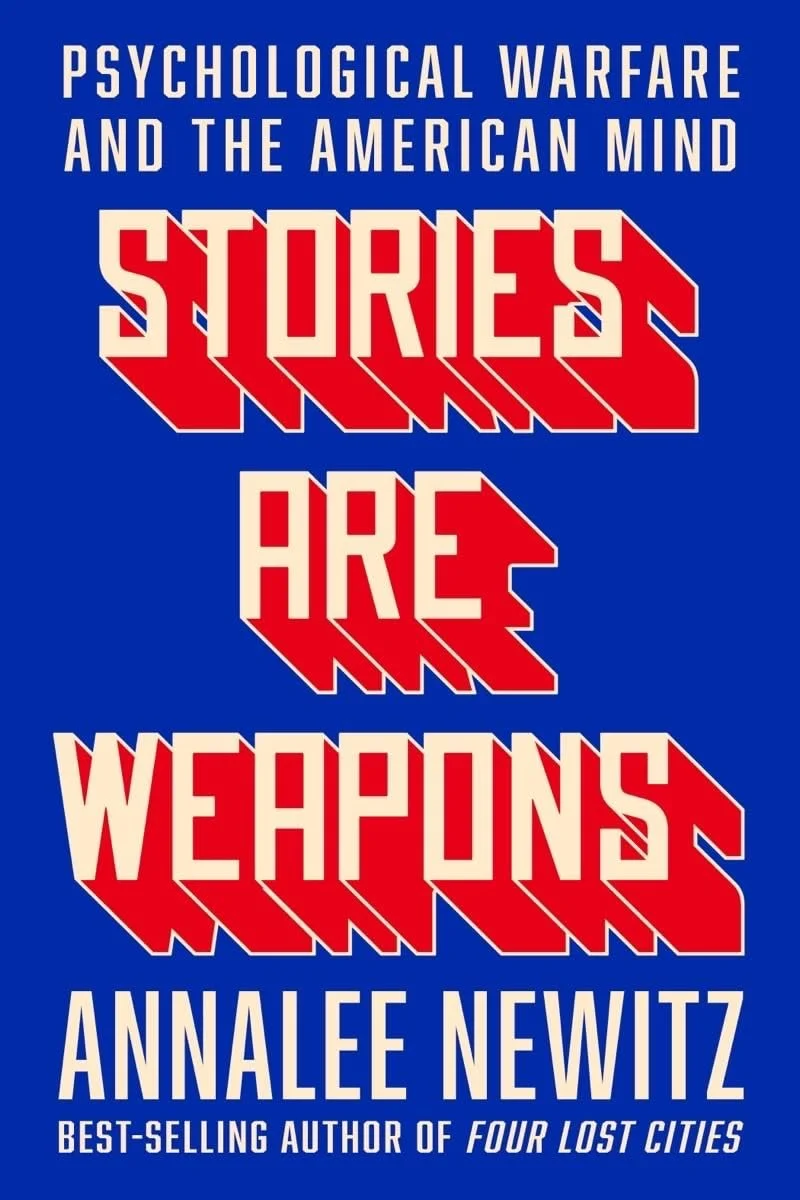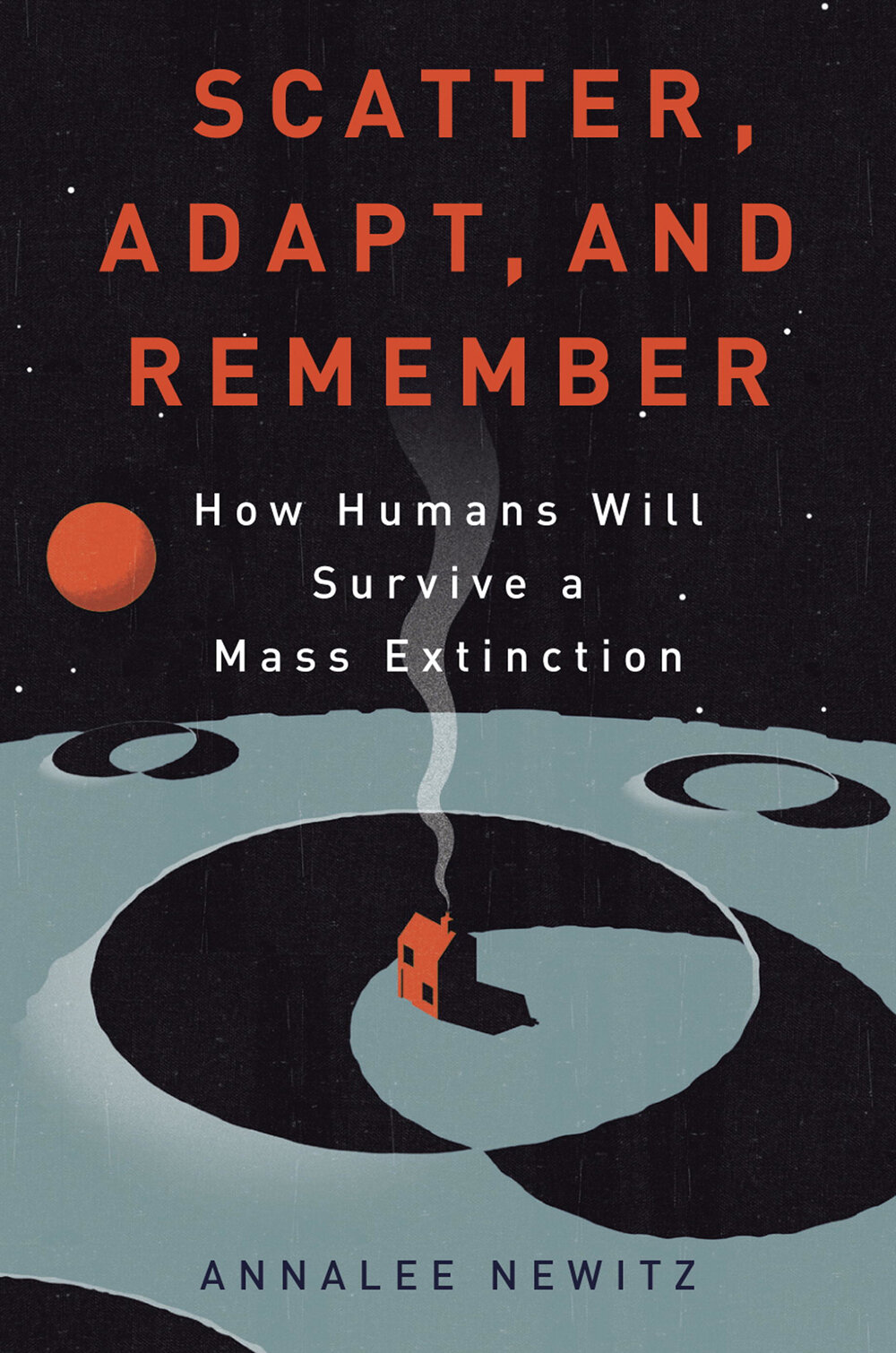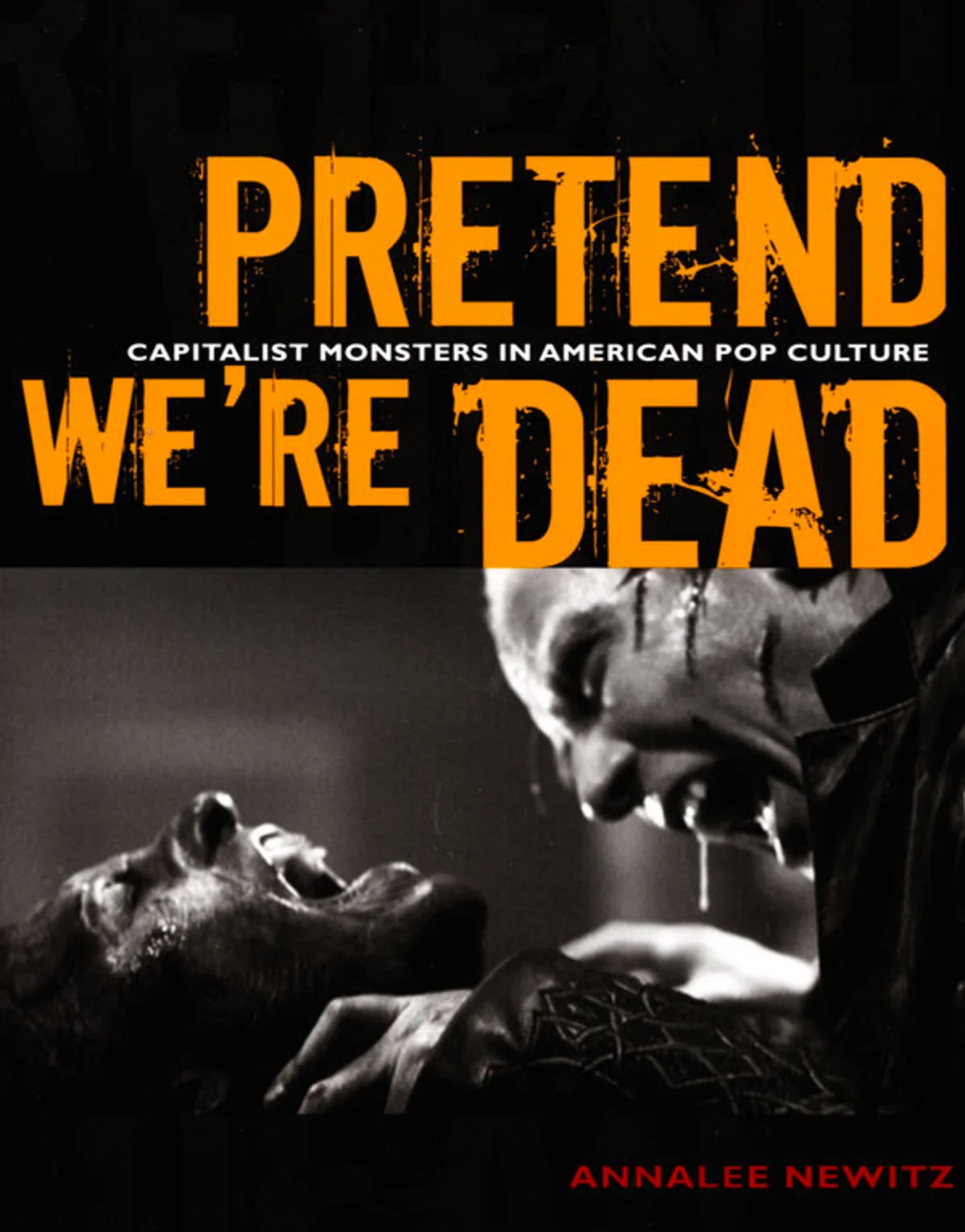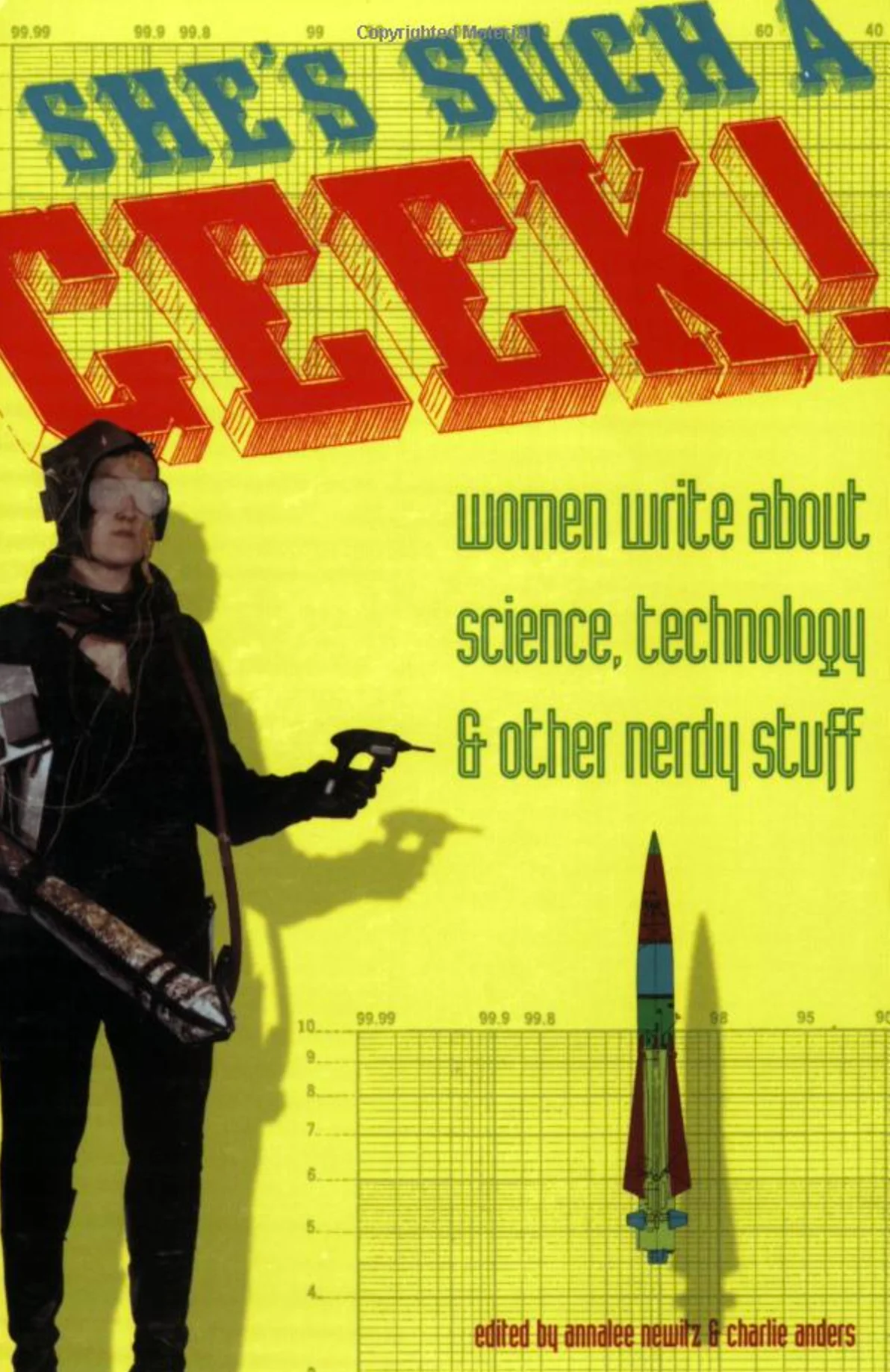nonfiction books
I love science and HIstory. Here are some books I've written about Them.
Coming June 4 from W.W. Norton. Pre-order here.
stories are weapons: Psychological warfare and the american mind
In Stories Are Weapons, best-selling author Annalee Newitz traces the way disinformation, propaganda, and violent threats—the essential tool kit for psychological warfare—have evolved from military weapons deployed against foreign adversaries into tools in domestic culture wars. Newitz delves into America’s deep-rooted history with psychological operations, beginning with Benjamin Franklin’s Revolutionary War–era fake newspaper and nineteenth-century wars on Indigenous nations, and reaching its apotheosis with the Cold War and twenty-first-century influence campaigns online. America’s secret weapon has long been coercive storytelling. And there’s a reason for that: operatives who shaped modern psychological warfare drew on their experiences as science fiction writers and in the advertising industry.
Now, through a weapons-transfer program long unacknowledged, psyops have found their way into the hands of culture warriors, transforming democratic debates into toxic wars over American identity. Newitz zeroes in on conflicts over race and intelligence, school board fights over LGBT students, and campaigns against feminist viewpoints, revealing how, in each case, specific groups of Americans are singled out and treated as enemies of the state. Crucially, Newitz delivers a powerful counternarrative, speaking with the researchers and activists who are outlining a pathway to achieving psychological disarmament and cultural peace.
Incisive and essential, Stories are Weapons reveals how our minds have been turned into blood-soaked battlegrounds—and how we can put down our weapons to build something better.
Here’s what people are saying:
Annalee Newitz’s thoroughly researched and masterfully crafted book gives us something hopeful—a way to disarm the narratives that have been used against us and reclaim better ones.
Ed Yong, Pulitzer Prize-winning author of An Immense World
A brilliant historical deep-dive into psyops, military covert influence operations, and the corporate attempts to conquer the mind. This will change the way you understand America.
Molly Crabapple, author of Drawing Blood
Well-researched, accessible, and grounded in history, Stories Are Weapons is at once clarifying, terrifying, and forward-looking. An important contribution to a particular moment in time when so many of us are desperate to try to understand the precarious societal moment and peril in which we find ourselves.
Anna Holmes, author of The Book of Jezebel
A penetrating, passionately-reasoned analysis of how propaganda and disinformation have been used as tactics of both hard and soft wars, and how we continue to be manipulated today. This is a storyteller’s account of the devastating force of storytelling.
Angela Saini, author of The Patriarchs
Annalee Newitz shows how words can have more power than even bullets and bombs. A read very much worth your time, as much to make you rethink the world around you.
P.W. Singer, author of LikeWar
Illuminating and energizing, Stories Are Weapons can help us defuse the propaganda bombs going off all around us. It also shows how we can come together to tell different stories—stories to shed light in the darkness, make sense amid chaos, and forge hope and community instead of fear and isolation.
Astra Taylor, author of The Age of Insecurity
four lost cities: a secret history of the urban age
A quest to explore some of the most spectacular ancient cities in human history—and figure out why people abandoned them.
In Four Lost Cities, I’ll take you on an entertaining and mind-bending adventure into the deep history of urban life. Investigating across the centuries and around the world, I explore the rise and fall of four ancient cities, each the center of a sophisticated civilization: the Neolithic site of Çatalhöyük in Central Turkey, the Roman vacation town of Pompeii on Italy’s southern coast, the medieval megacity of Angkor in Cambodia, and the indigenous metropolis Cahokia, which stood beside the Mississippi River where East St. Louis is today.
I traveled to all four sites and investigated cutting-edge research in archaeology, revealing the mix of environmental changes and political turmoil that doomed these ancient settlements. Tracing the early development of urban planning, I’ll also introduce you to the often anonymous workers—slaves, women, immigrants, and manual laborers—who built these cities and created monuments that lasted millennia.
Four Lost Cities is a journey into the forgotten past. But it also offers a way to understand our future as an urban species.
Check out the Four Lost Cities photo gallery!
Here’s what people are saying about it:
“The book functions as a travel guide to places that no longer exist...[it] filled me with wonder.” — Russell Shorto, New York Times Book Review
"Superbly detailed…Four Lost Cities is more energising than elegiac.” — Nilanjana Roy, The Financial Times
“Most of humanity lives in places that are ‘destined to die,’ and we’re terrible at doing much about it … But what’s unique about Newitz is that this knowledge doesn’t drive them to despair.” — San Francisco Chronicle
“Annalee Newitz always sees to the heart of complex systems and breaks them down with poetic ferocity.”
—N. K. Jemisin, author of the Broken Earth trilogy and The City We Became
“In their fascinating book Four Lost Cities, Annalee Newitz journeys to a quartet of ancient ghost cities, asking not only why they once thrived but why they ultimately vanished. The result is a deeply insightful look at human culture everywhere: inventive, social, resilient, and hauntingly fragile.”
—Deborah Blum, Pulitzer Prize-winning author of The Poison Squad
“Annalee Newitz is a brilliant writer with the heart of an archaeologist and the soul of a visionary. Four Lost Cities should open eyes to all that may happen to our cities in the future. Vibrant and adventurous, this is a necessary book for turbulent times.”
—Sarah Parcak, author of Archaeology from Space
“Cheerful, curious, amused and amusing, Annalee Newitz is a fabulous tour guide through the latest archaeological perspectives on four of humankind’s most remarkable urban experiments. Along the way, Newitz dispels myths, evokes fascinating stories—and makes us think hard about our own urban future.”
—Charles Mann, author of 1491 and 1493
"Drawing on four examples from the ancient world, Annalee Newitz gives us clear-eyed insight into how cities never are truly lost; they just change with their times. Newitz takes readers on a journey that reveals as much about the future of cities as it does about our urban past. Beautifully written, Four Lost Cities tells a fascinating tale of disaster and resilience that is welcome in our uncertain era."
—Andrew Lawler, author of The Secret Token
scatter, adapt, and remember: how humans will survive a mass extinction
Nominated for the LA Times Book Prize for 2013, this speculative work of science journalism explores what comes after we accept that we're facing a sixth mass extinction on planet Earth.
In its 4.5 billion-year history, life on Earth has been almost erased at least half a dozen times: shattered by asteroid impacts, entombed in ice, smothered by methane, and torn apart by unfathomably powerful megavolcanoes. And we know that another global disaster is eventually headed our way. Can we survive it? How? Although global disaster is all but inevitable, our species is well-equipped for long-term survival.
Scatter, Adapt, and Remember explores how life survived previous mass extinctions, and why the situation is different now that humans are reshaping the planet's ecosystems and climate. We have the tools we need to survive disaster—scientifically, it's even plausible that we could prevent the worst effects of climate change. The question is how we'll implement them.
I went on a quest to find out, hopping between labs, nature preserves, and remote underground cities to find out what it will take for humans to save the world—and ourselves.
Praise for Scatter, Adapt, and Remember:
“Few things are more enjoyable than touring the apocalypse from the safety of your living room. Even as Scatter, Adapt, and Remember cheerfully reminds us that asteroid impacts, mega-volcanos and methane eruptions are certain to come, it suggests how humankind can survive and even thrive. Yes, Annalee Newitz promises, the world will end with a bang, but our species doesn’t have to end with a whimper. Scatter, Adapt, and Remember is a guide to Homo sapiens’ next million years. I had fun reading this book and you will too.”
—Charles C. Mann, author of 1491
“Fascinating. . . . [Newitz is] an excellent writer, with an effortless style. . . . The inner science geek in all of us will uncover some really cool stuff. . . . A terrific book that covers an astounding amount of ground in a manageable 300 pages. Newitz has done all the mental heavy lifting, all the hard work and research, and presented it so you get to enjoy it in a few days or weeks of fun reading. You will be smarter for it.”
—San Francisco Chronicle
“One of the best popular science books I’ve read in a long, long time—and perhaps the only one that takes such a clear-eyed view of the future.”
—Seth Mnookin, author of The Panic Virus
Pretend we're dead: capitalist monsters in american pop culture
My Ph.D. thesis was about representations of monsters and psychopaths in 20th century American pop culture. I focused on a few character tropes, including the mad scientist, the undead, and the cyborg, and traced how stories about them changed over a hundred-year arc.
In it, I argued that the slimy zombies and gore-soaked murderers who have stormed through American film and literature over the past century embody the violent contradictions of capitalism. Ravaged by overwork, alienated by corporate conformity, and mutilated by the unfettered lust for profit, fictional monsters act out the problems with an economic system that seems designed to eat people whole.
In 2006, Duke University Press published a much-improved version of my dissertation in the form of a book.
She's Such a geek! women write about science, technology, and other nerdy stuff
I co-edited this anthology with Charlie Jane Anders, and Seal Press published it in 2006. It's a anthology that brings together a diverse range of critical and personal essays about the meaning of female nerdhood by women who are in love with genomics, obsessed with blogging, learned about sex from Dungeons and Dragons, and aren’t afraid to match wits with men or computers. Some contributors like scientists/technologists Ellen Spertus, Roopa Ramamoorthi, and Corie Ralston work in traditionally male-dominated professions. Cyberlaw professor Wendy Seltzer describes how her involvement with law and politics started with a love for building computers. Others consider themselves cultural nerds: Devin Grayson writes comic books, while other contributors read science fiction and play in professional videogame competitions. The collection also features essays by high school girls, as well as nerdy mothers who are balancing childrearing with their careers.
Celebratory, polemical, wistful, angry, and just plain dorky, the women of She’s Such a Geek explain what it means to be passionately engaged with technical or obscure topics that are supposed to be “for boys only,” while busting stereotypes of what it means to be a geek and what it means to be female. More than anything, She’s Such a Geek is a celebration and call to arms: it’s a hopeful book which looks forward to a day when women will invent molecular motors, design the next ultra-tiny supercomputer, and run the government.





